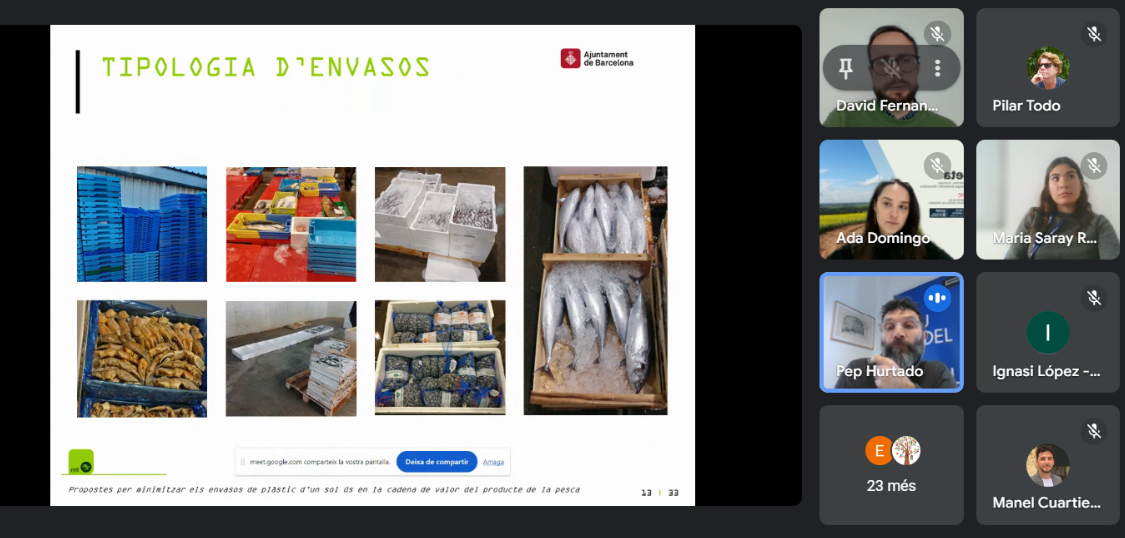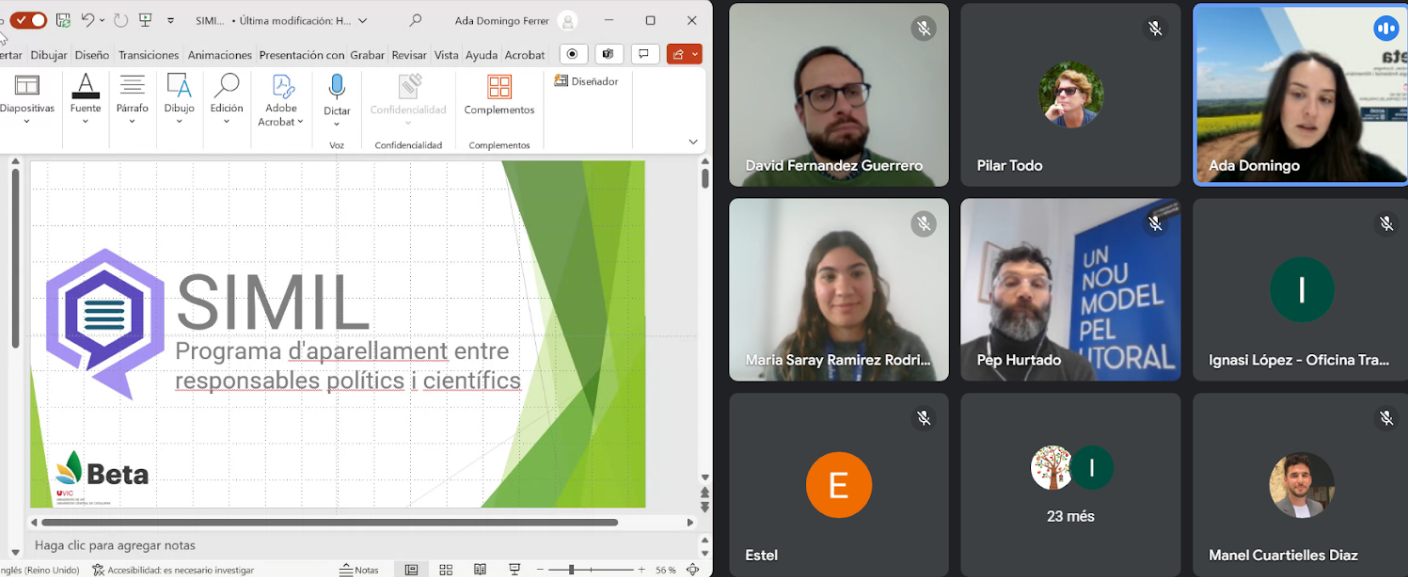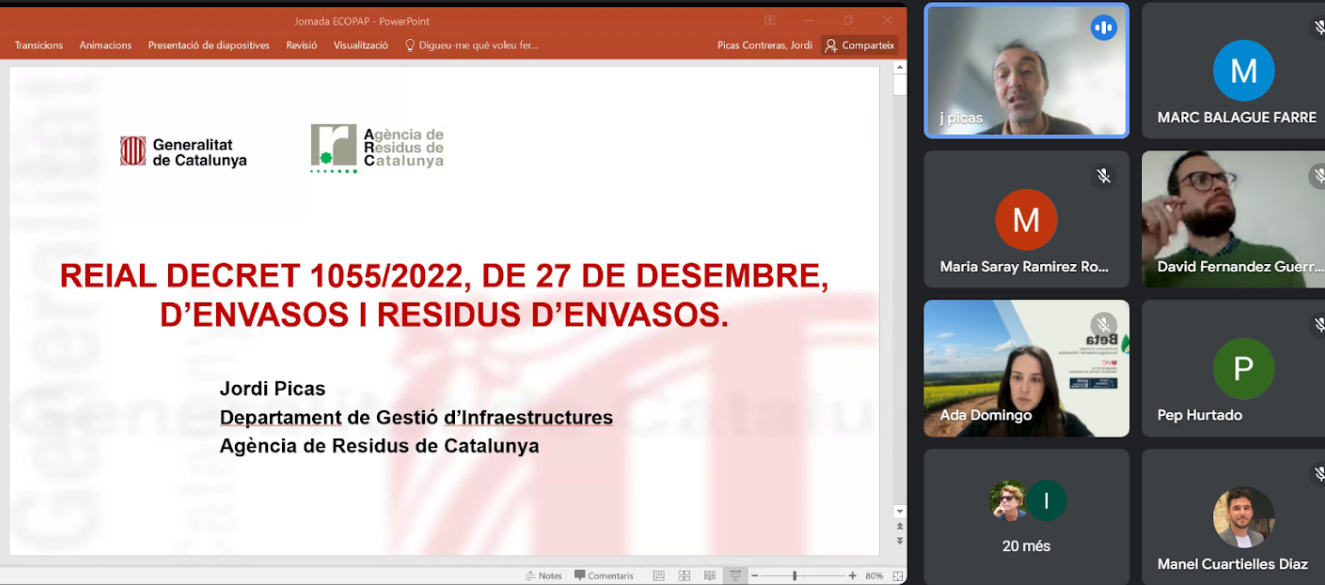- The final event, which took place on Thursday, February 8, had a total of 32 attendees.
- The ECOPAP project, part of the program of Desenvolupament Rural de Catalunya 2014-2022 (PDR), aims to find solutions for the management of plastic waste in the context of a circular economy.
- The representatives of Ajuntament de Barcelona, BETA, and the Agència de Residus de Catalunya shared the proposals for innovations and regulations for the different value chains.
February 13, 2024
The Centre for Agro-Food Economics and Development (CREDA) hosted last February 8, the presentation of the results and conclusions of the project ECOPAP (Economia Circular per a l’Optimització dels Plàstics Agroalimentaris del Penedès), which started in July 2022.
The final event ‘Col·laborant per afrontar el repte de la circularitat al sector agroalimentari’, which was carried out online, had the participation of representatives of entities such as Ajuntament de Barcelona, the BETA technology centre , and the Agència de Residus de Catalunya. In addition, it welcomed a total of 32 attendees.
The ECOPAP project is part of the program of Desenvolupament Rural de Catalunya 2014-2022 (PDR) of the Departament d’Acció Climàtica, Alimentació i Agenda Rural, and aims to find solutions that help face the challenge of managing plastic waste in the sector During the two-year project, ECOPAP has identified the needs of four value chains in the Penedès regions (wine, olive, poultry, and fisheries), as well as various innovations applicable to each of them.
With the aim of presenting some of the innovations discovered, the speakers shared the ideas and proposals to be developed in the coming years. Pep Hurtado of the Oficina Estratègica de l’Àmbit Litoral, presented the study that the Ajuntament de Barcelona has carried out with the aim of reducing the use of plastics in the different branches of the fishing sector. “We are not looking to change the type of plastic, or to pass it on to another side, but directly to reduce its use“, Hurtado emphasized, “there is a great dependence on single-use plastics, especially in the final sale where 90% are non-reusable containers”.
Among the proposals of the Barcelona body is the use of returnable buckets, wooden boxes or plastic nets, and the idea of the Organització de Productors Pesquers Peix Blau (OPP 87 O Peix Blau) to use reusable boxes for blue fish in Catalan fish markets. However, the study is not finished, and the initiatives are still provisional.


In the same way, Ada Domingo, project manager at the BETA Technology Center, presented SIMIL, a pairing program between political leaders and scientists. This initiative, “intends to promote dialogue and the exchange of knowledge between both personalities“, she explained. Thus, through group work sessions and visits to examples of success, BETA has brought together a total of 29 local and regional political leaders.
Apart from the proposed alternatives for collecting plastics and self-composting, the aim of this program is to deal with the management of municipal organic waste as a source of energy or products with high added value. Nevertheless, Domingo emphasized that “there is a great lack of knowledge and social interest in biogas plants and their management“.
In legal terms, there is also a lack of knowledge within the plastics sector, as legislation changes over time. For this reason, Jordi Picas, representative of the Waste Agency of Catalonia, participated in the session and made known all the regulations and points included in Royal Decree 1055/2022, of December 27, on packaging and packaging waste.
“The main objective we have is to reach the year 2030 and eliminate all non-recyclable packaging, while promoting the use of reusable ones in any link of the chain“, explained Picas who also recalled that, “this would mean the obligation for food establishments to accept the use of these types of containers“. A situation that is resolved with the proposal to pay deposits for the packaging, so that consumers pay a supplement for the packaging, but in case of returning it to the trade, they get the deposit back.

This Royal Decree aims to include all types of packaging, regardless of what they are used for or produced, however, it does differentiate between service packaging, which are those intended to be filled at the point of sale like bags , trays or plates, and superfluous packaging, which are those that excessively exceed the minimum to offer safety and hygiene levels. “In these cases, the responsibility will be of the shops and final points of sale“, assured Picas.
ECOPAP, which started in 2022 and ends this 2024, has identified 22 innovations that are applicable to the challenges of plastic waste management in the four value chains studied (wine, olive, poultry and, fisheries).
![]()
![]()

